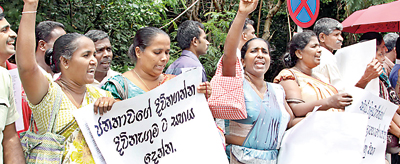Columns
Divineguma facilitates the concentration of power
The controversial Divineguma Bill appears to be yet another move by the Government that points to a pattern of rushing legislation through without due regard for the need for, and the right to, debate and discussion on matters of public importance. It was not so long ago that the 18th Amendment was steamrollered through parliament, followed by the infamous Expropriation Bill.
The labeling of these pieces of legislation as ‘urgent,’ thereby shortening the time span within which they could be challenged in court, is seen by many as a device used by government to bypass legitimate objections. Once a bill is passed into law it is not possible to challenge it.

Pro-govt. supporters calling for the enactment of the Divineguma Bill
If the Divineguma Bill has now come in for a measure of public discussion, it is only thanks to the petitions that challenged its constitutionality, and the subsequent Supreme Court ruling that said it required the approval of Provincial Councils before it could be tabled in parliament. As a result of the Bill being taken up by the Provincial Councils, Opposition members in the provincial bodies are able to raise certain issues during the debates in their respective councils, and these are in turn being reported in the media.
If not for this limited discussion, the public may not have had any insight into the contents of the Bill.
The Divineguma Bill seeks to amalgamate the Samurdhi Authority, Southern Development Authority and Udarata Development Authority under one department and establish community banking societies. The court determined that the Bill required the approval of the PCs because it refers to matters that come under their purview. This led to the withdrawal of the Bill from the parliament’s order paper.
One of the main criticisms that emerged in the debates held so far in the PCs relates to the concentration of power in the hands of one person — namely Economic Development Minister Basil Rajapaksa, who will be in charge of the new department.
The JVP has opposed the Bill for this reason. Its Western PC member Nalinda Jayatissa has revealed details of how the department would be controlled. Five members of the board that oversees the department will be appointed by the subject minister (Basil Rajapaksa). The minister could appoint another member as his representative. Still another board member can be appointed by the Finance Minister (the Finance Minister being President Rajapaksa). Jayatissa has further pointed out that the ‘community based banks’ to be set up under the proposed law are not required to be registered with the Central Bank. This is a serious matter, he said. It is reported that as much as Rs. 80 billion in public funds will come under the purview of the new department.
One of the seemingly most peculiar clauses of the Bill is that pertaining to secrecy. It is reported that employees of the new department will be prohibited, under pain of being imprisoned or fined, from disclosing information unless it is required by a court of law. Not surprisingly this provision has come in for criticism owing to its apparent disregard of the need for financial transparency. Jayatissa described it as a ‘draconian’ clause. The very fact that such a clause has been introduced gives rise to misgivings.
It is relevant to note that this provision is being included in a proposed piece of legislation at a time when several scandals have been exposed relating to the misuse of public funds. The controversial NSB share purchase from The Finance Company – a transaction which was ‘reversed’ by the Securities and Exchange Commission after public outcry — and the alleged stock market manipulation by a ‘mafia’ of politically well connected investors, are cases in point. It was only this week that UNP MP Sujeewa Senasinghe complained to the Bribery Commission that funds of the Employees Provident Fund (EPF) and
Employees Trust Fund (ETF) were illegally invested in the stock market. In his estimation a loss of Rs 12 billion has been incurred as a result.
The TNA challenging the Divineguma Bill in the Supreme Court has argued that the secrecy clause is a threat to the right to information. It must be said that in a context where media freedom is already compromised by the absence of a Right to Information Act, the attempt to introduce legislation including
a clause of this nature reflects poorly on the government’s bona fides.UNP MP and economist Harsha de Silva has argued in parliament that cabinet approved this Bill on the basis that it was “in the Mahinda Chinthanaya”. Ridiculing this position, he said that the Mahinda Chinthanaya is a political document, whereas it is the Constitution that needs to be followed in this matter. “Politicians can say this kind of thing in some village, for political purposes. But when the government’s legal team argues like this in the Supreme Court, it takes things to a different level,” he protested.
De Silva says the Bill is an attempt to consolidate power in the hands of Minister Rajapaksa. “Funds are to be collected by the so-called Divineguma Societies purportedly for village development, but in reality they will be used for political objectives,” he said.
The Divineguma Bill has already been passed by the Western, North Western and Uva Provincial Councils. The Government seems confident of securing the Bill’s passage in the PCs since the UPFA coalition has majorities in most of them. It is uncertain how the Government will get around the requirement for approval from a non-existent Northern Provincial Council.
Follow @timesonlinelk
comments powered by Disqus















